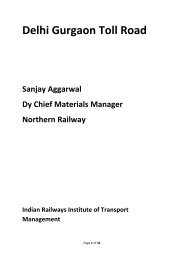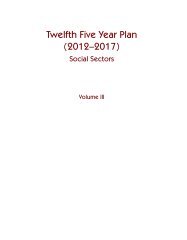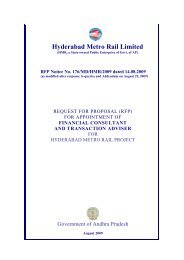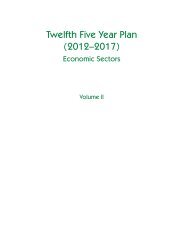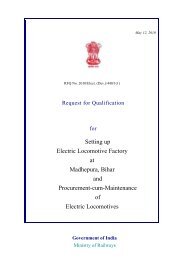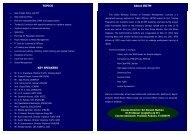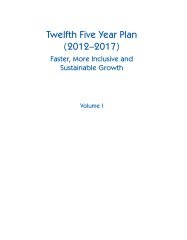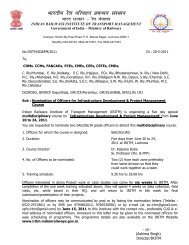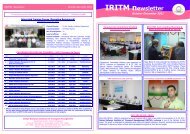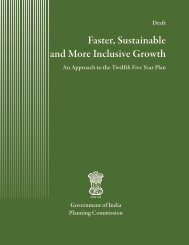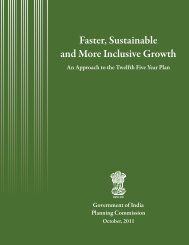Vision 2020 - Transportation Research Group of India
Vision 2020 - Transportation Research Group of India
Vision 2020 - Transportation Research Group of India
Create successful ePaper yourself
Turn your PDF publications into a flip-book with our unique Google optimized e-Paper software.
Government <strong>of</strong> <strong>India</strong><br />
Ministry <strong>of</strong> Railways<br />
(Railway Board)<br />
58<br />
f)<br />
segregated passenger corridors. High speed point-to-point services and overnight connectivity between<br />
national and state capitals and between state capitals and other major cities would be provided at regular<br />
frequencies.<br />
High-capacity coaches with optimized ergonomic design and double-decker coaches for<br />
intercity trains would be developed. Seats/berths in the coaches would be innovatively designed to<br />
allow for flexible use for both day and night travel.<br />
g) Popular trains would be augmented to 24-26 coaches.<br />
h) Adequate rolling stock would be inducted for suburban services. Air-conditioned EMUs would be<br />
introduced.<br />
i) Real time on line enquiry systems would be universalized.<br />
j)<br />
k) Sanitation and waste management at stations will receive high priority. Each station would be studied for<br />
its peculiarities and a well thought out plan will be devised to achieve near-zero-waste by adopting the<br />
principle <strong>of</strong> reduction, recycle and re-use and improve the cleanliness <strong>of</strong> the stations benchmarked to the<br />
best in the world. Performance criteria and standards will be evolved for each element <strong>of</strong> cleanliness and<br />
achievement <strong>of</strong> these standards will be monitored at all levels.A unified system <strong>of</strong> responsibility for<br />
cleanliness at stations with adequate financial and oranisational resources will be put in<br />
place.Infrastructure and amenities like water supply, drainage, sewerage,washable aprons, properly<br />
designed platforms and 'pay and use toilets' maintained by competent agencies along with user<br />
awareness campaigns will form part <strong>of</strong> the plan. Coordination with city authorities will be maintained to<br />
achieve this objective. Cleanliness <strong>of</strong> trains would be enhanced by retr<strong>of</strong>itting all coaches with dischargefree<br />
green toilets, mechanized cleaning at maintenance terminals, onboard housekeeping and en route<br />
mechanized cleaning at Clean Train Stations. Maximum recycling <strong>of</strong> water will be planned and achieved.<br />
Pr<strong>of</strong>essional assistance will be utilized for pest and rodent control.<br />
l) Quality cleaning <strong>of</strong> bed linen would be ensured through mechanized laundries.<br />
5 Parcel<br />
Quality <strong>of</strong> catering would be improved by adopting sound and proven business practices,<br />
setting up a chain <strong>of</strong> modern base-kitchens and branded restaurants at stations and encouraging<br />
innovation and local cuisines in on-board catering.<br />
a) Dedicated parcel terminals would be set up and time-tabled super-fast parcel services would be run.<br />
b) The business would be segregated from passenger services.<br />
c) Partnership would be formed with the private sector to provide end-to-end logistics. Adequate number <strong>of</strong><br />
parcel vans (200 per annum as against 100 at present) would be inducted annually in partnership with the<br />
private sector. This would include refrigerated parcel vans to carry fruits, vegetables and perishables and<br />
special-purpose rolling stock to the carry automobiles..<br />
6 Rolling Stock (Mechanical)<br />
a) Locomotive and coach manufacturing units would be modernized and augmented. The coach<br />
manufacturing capacity at Integral Coach Factory, Perambur and Rail Coach Factory, Kapurthala would<br />
be augmented to 1500 per annum each. New coach manufacturing units at Rai Bareily (1000 coaches per<br />
annum), Palghat (600 coaches per annum) and Kanchrapara (500 EMU/MEMU/DEMU coaches) would<br />
be commissioned.




